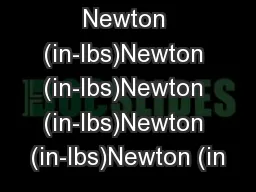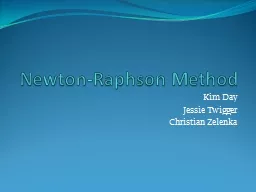PPT-NEWTON’S FIRST LAW OF MOTION
Author : test | Published Date : 2016-11-06
The Law of Inertia The first law says that an object at rest tends to stay at rest and an object in motion tends to stay in motion with the same direction and speed
Presentation Embed Code
Download Presentation
Download Presentation The PPT/PDF document "NEWTON’S FIRST LAW OF MOTION" is the property of its rightful owner. Permission is granted to download and print the materials on this website for personal, non-commercial use only, and to display it on your personal computer provided you do not modify the materials and that you retain all copyright notices contained in the materials. By downloading content from our website, you accept the terms of this agreement.
NEWTON’S FIRST LAW OF MOTION: Transcript
Download Rules Of Document
"NEWTON’S FIRST LAW OF MOTION"The content belongs to its owner. You may download and print it for personal use, without modification, and keep all copyright notices. By downloading, you agree to these terms.
Related Documents














